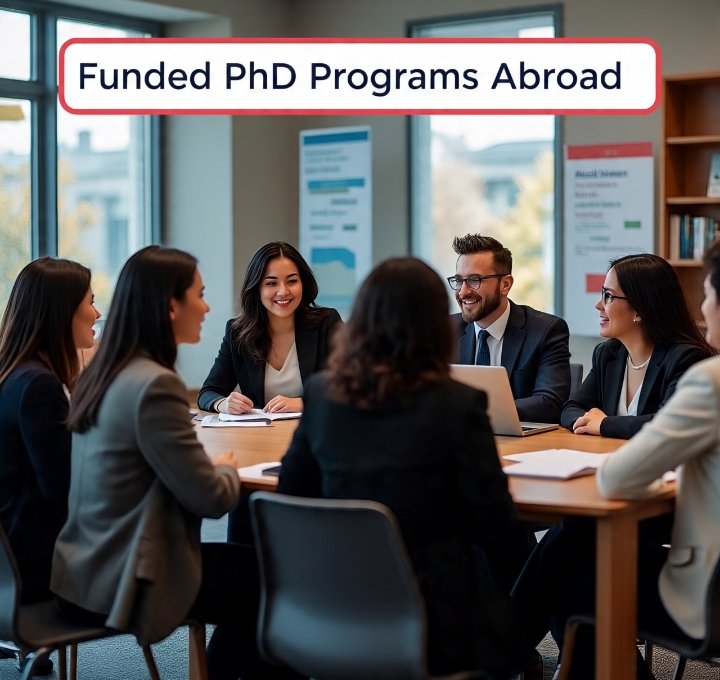Have you ever thought about studying for your PhD outside Nigeria without worrying about the crazy cost? Well, that’s what fully funded PhD programs abroad are all about. These programs cover your tuition fees, living expenses, and sometimes even your travel costs. That means you can focus on your studies and not stress about how to pay the bills.
For many Nigerian students, doing a PhD abroad feels like a dream that’s too expensive or impossible. But guess what? It’s not. There are many opportunities out there, and if you know where to look and how to prepare, you can get one of them. So, let’s walk through this together.
Fully Funded PhD Programs Abroad
Why You Should Consider A Fully Funded PhD Abroad
Let’s be real, studying abroad is expensive. Even master’s programs can cost millions of naira. A PhD can take three to five years, sometimes more, so without funding, the cost can be overwhelming. Fully funded programs solve that problem.
Another big reason is the quality of education. Many top universities abroad have world-class facilities, experienced professors, and cutting-edge research opportunities. You’ll be exposed to new ideas, cultures, and networks that can change your life forever. And honestly, who doesn’t like the idea of exploring a new country while chasing their academic dreams?

Top Countries That Offer Fully Funded PhDs
There are many countries you can look at, but let’s start with a few popular ones.
United States
The US is one of the best places for fully funded PhDs. Most PhD programs in the US automatically include funding packages. These usually cover tuition and give you a stipend. Schools like Harvard, MIT, and Stanford are famous, but there are hundreds of other universities that offer great funding.
United Kingdom
In the UK, fully funded PhDs often come from scholarships like the Commonwealth Scholarships or Chevening. Some universities also have their own funding. The PhD programs here are usually shorter than in the US, about three to four years.
Canada
Canada is friendly to international students, and many universities there provide full funding. Programs in Canada often include teaching or research assistant positions to help cover your expenses.
Germany
Did you know that most public universities in Germany don’t charge tuition fees, even for international students? Many programs also offer extra funding for living costs. Plus, Germany is known for high-quality research.
Australia
Australia offers scholarships like the Australia Awards or university-based funding for PhD students. It’s a beautiful place to study, with great weather and amazing wildlife.
Netherlands
Dutch universities are famous for research, and many of them offer PhD positions as paid jobs. This means you’re technically an employee while completing your studies.
Examples Of Fully Funded PhD Opportunities
Here are a few programs you might want to check out:
- Fulbright Foreign Student Program (USA): Covers tuition, living costs, travel, and health insurance.
- Commonwealth Scholarships (UK): Aimed at students from developing countries like Nigeria.
- DAAD Scholarships (Germany): Covers tuition and living costs.
- Vanier Canada Graduate Scholarships (Canada): Offers generous funding for top students.
- Australia Awards (Australia): Fully funded scholarships for students from Africa.
- Erasmus Mundus Joint Doctorates (Europe): Funded PhDs across different European countries.

Steps To Apply For Fully Funded PhDs
Here’s a simple way to approach your application:
Step 1: Research Programs And Deadlines
The first thing you need to do is spend time researching the programs that fit your field. Don’t just pick the first one you see. Look at different universities, the kind of research they’re doing, and what kind of funding they offer. Visit their official websites and check if they list full funding or scholarships for international students. Sometimes you’ll even find stories or blogs from other students who have been there, which can give you helpful tips.
Step 2: Contact Potential Supervisors
Most PhD programs want you to have a supervisor before you even apply. A supervisor is like a mentor who guides your research. Start by finding professors whose research matches what you’re passionate about. Read their published papers or their university profiles to understand their work. When you email them, keep your message polite and short. Tell them who you are, what you’re interested in, and why you’d like to work with them.
Step 3: Prepare Your Documents
Your documents are the story you’re telling about yourself, so make sure they’re neat and clear. This includes your CV, your transcripts, recommendation letters, and your personal statement. Take your time to write a strong personal statement. Share your passion for your field and your long-term goals. Show them why you’d be a great fit for the program.
Step 4: Submit Your Application
Now that you’ve got your documents ready, it’s time to actually send in your application. Carefully read the instructions on the university’s website. Every school has slightly different requirements, so don’t assume they’re all the same. Check if there are extra forms or essays you need to include.
Step 5: Prepare For Interviews
If your application is shortlisted, you may be invited to an interview. This is your chance to show your enthusiasm and knowledge. Don’t panic, it’s not about being perfect, it’s about sharing your passion and your goals. Review your research interests and be ready to talk about why you chose that field. Practice answering simple questions with a friend or even in front of a mirror.
Step 6: Wait And Stay Positive
After sending your application and maybe doing an interview, the waiting begins. This part can feel long and stressful, but it’s normal. Use this time wisely, keep improving your skills, maybe work on a small research project, or learn something new. Staying productive can help distract you from the waiting.
FAQs
Can Nigerian students really get fully funded PhDs abroad?
Yes, they can. Every year, Nigerian students get these opportunities. Universities want bright and hardworking students from around the world, and Nigerians are doing well in many fields.
Which countries are best for fully funded PhDs?
The United States, United Kingdom, Canada, Germany, Australia, and the Netherlands are very popular choices. These places have strong universities and many scholarships. Other countries in Europe like Sweden, Norway, and France also offer great funding options.
Do I need to have a master’s degree before applying?
In most cases, yes, a master’s degree is expected. But some programs in places like the US accept students directly after a bachelor’s if you have strong academic records and research experience.
Do I have to take tests like GRE, TOEFL, or IELTS?
Many programs will ask for English tests like TOEFL or IELTS if English is not your first language. Some US programs may require the GRE, but many schools are now dropping it.
What if I don’t get accepted?
Don’t give up. Many students get rejected the first time. You can apply again the next year, improve your CV, or apply to more programs. Rejections are common and don’t mean you’re not good enough.
Can I work while doing my PhD?
Some countries allow part-time work during your PhD, but with a fully funded program, you may not need extra work.
Conclusion
If you’ve been dreaming about doing a PhD abroad but worrying about the cost, now you know there’s hope. Fully funded programs are real, and Nigerian students are getting them every year. You just need to prepare, stay determined, and believe in yourself.
Start researching today. Reach out to professors. Polish your CV and personal statement. And don’t be afraid to aim high. Who says you can’t be the next Nigerian scholar making waves abroad? You just have to submit the application today.
